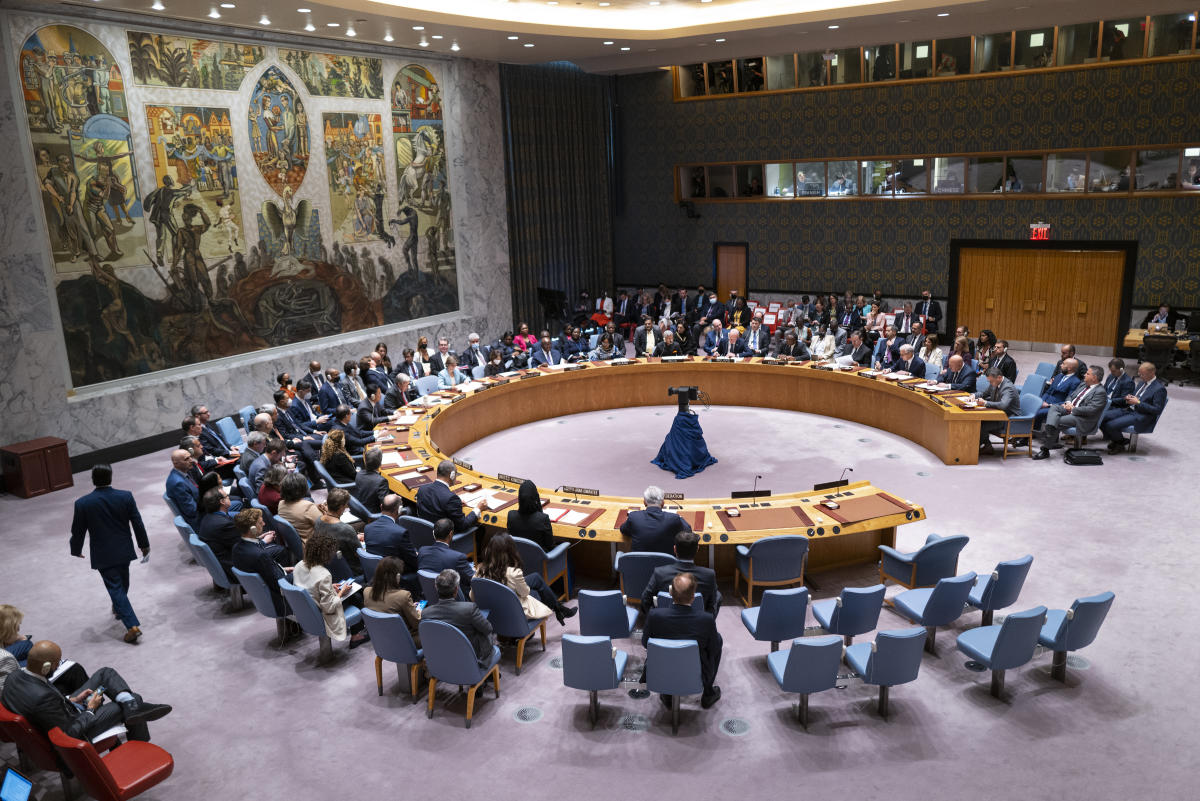
UNITED NATIONS (AP) — Virtually everyone involved agrees: Almost eight decades after it came into existence, the powerful U.N. Security Council needs to expand, to evolve, to include more voices. But as with so many things, the central question — and the biggest disagreement — is exactly how.
Five countries that were major powers at World War II’s end have dominated the United Nations and its most important body for its 77-year history. The council remains in its current configuration despite a four-decade clamor for other countries to join that VIP group to reflect the dramatically changed 21st-century world.
The council’s failure to respond to Russia’s invasion of Ukraine has, at this month’s gathering of world leaders, shone a spotlight on another misstep: Consumed by national interests and regional rivalries, the 193 U.N. member nations have blocked expansion of the body charged with ensuring international peace and security.
The postwar era when the United Nations was created reflected a desire to, in the U.N. Charter’s opening words, “save succeeding generations from the scourge of war.” An updated council with more voices could re-center that premise, advocates say. But disagreements on the size, composition and powers of a revamped council have left generations of U.N. diplomats wondering whether it will ever change.
U.N. Secretary-General Antonio Guterres pinpointed the problem in 2020: “The nations that came out on top more than seven decades ago have refused to contemplate the reforms needed to change power relations in international institutions.”
“Inequality starts at the top —in global institutions,” Guterres said then. “Addressing inequality must start by reforming them.” But it hasn’t happened yet.
HOW IT IS NOW
The 15-member Security Council has 10 non-permanent members from all regions of the world elected for two-year terms without veto power and five permanent members with veto power: the United States, Russia, China, Britain and France.
Two of those members are represented by different governments than they were when the United Nations was established in 1945. The Republic of China, now governed from Taiwan, is excluded from virtually all U.N. bodies, which are occupied by the mainland-governed People’s Republic. The Soviet Union dissolved in the early 1990s, leaving Russia as its surviving power.
It is Russia’s use, and threatened use, of its veto that has blocked the council from taking action on the now seven-month-old war in Ukraine. It is a failure noted by many leaders in their General Assembly speeches, alongside their perennial complaints that the council is outdated and unrepresentative.
Of particular annoyance to governments in Africa, Latin America and the Caribbean: They have no permanent members. Can that change? The American president thinks it must.
“The time has come for this institution to become more inclusive so that it can better respond to the needs of today’s world,” Joe Biden told the General Assembly last week.
He called for increasing the number of both permanent and non-permanent members, including “permanent seats for those nations we’ve long supported and permanent seats for countries in Africa, Latin America and the Caribbean.” The United States also supports permanent seats for Germany, Japan and India.
Peace, said French President Emmanuel Macron, requires an international consensus. “That’s why I hope that we can finally commit to reforming the Security Council so that it’s more representative, welcomes new permanent members, and remains capable of fully playing its role, by limiting the use of veto rights in instances of mass crimes,” he said.
And Russian Foreign Minister Sergey Lavrov, who addressed the assembly Saturday, called for a “more democratic” council by broadening representation from Africa, Asia and Latin America and adding India and Brazil. At a news conference afterward, he said adding “hostile” Western countries like Japan and Germany would bring nothing new to the council: “They are all following the orders of the United States.”
HOW REFORM MIGHT WORK
Attempts to reform the council began in 1979. In 2005, world leaders called for the council to be “more broadly representative, efficient and transparent.” That year, the General Assembly, which must approve any council reforms, shelved three rival resolutions to expand its membership, a reflection of deep divisions that continue today.
One resolution by Germany, Japan, Brazil and India would give them permanent seats without veto rights on a 25-member council. A second by a group of middle-ranking countries, including Italy and Pakistan, wants 25-member council with 10 new non-permanent seats. The now 55-member African Union wanted to add 11 new spots: six permanent seats, including two for Africa with veto power, and five non-permanent ones.
Senegalese President Macky Sall, the African Union chairman, reiterated its demand for two permanent seats, saying it’s time to stop “confining Africa to the margins of decision-making circles.” Brazilian President Jair Bolsonaro said the Ukraine war proves that “a reform of the U.N. is essential if we are to find world peace.”
Barbados’ prime minister, Mia Mottley, called for removing veto power from the five permanent members: “A Security Council that retains the power of veto in the hands of a few will still lead us to war.” And Turkish President Recep Tayyip Erdogan said his country “will continue to underline that `the world is bigger than five.'”
Virtually all General Assembly presidents in recent years have held negotiations on Security Council reform. Maldives Foreign Minister Abdulla Shahid, who stepped down as president this month, lamented that he wasn’t able to conclude a deal “to reflect the new reality of the world.” His successor, Csaba Kőrösi, vows to press on.
“It is high time that the council represents the world’s population more equally, and that it reflects 21st century realities,” Kőrösi said.
This year, the General Assembly adopted one reform: Any permanent council member casting a veto must now appear before the assembly’s 193 nations during a debate to explain why.
David Scheffer, a former U.S. ambassador-at-large for war crimes issues, said Biden’s proposal “reaches beyond anything the U.S. government has stated before on this issue” and “accepts the reality of the world we live in today, and not the world of 1945 at the end of a transformative war.”
“The United States needs to be the collaborative superpower of the future, and this will be an important step in that direction,” he told The Associated Press.
Richard Gowan, U.N. director of the International Crisis Group, called Biden’s remarks on reform “a smart political gambit” that created a stir among diplomats and U.N. officials. The remarks, he said, reflect a U.S. concern that the council’s credibility is waning — and that it serves American interests “to have a more-or-less functional council as an alternative to anarchy.”
“China especially hates the idea that Japan and India could exploit reform discussions to secure permanent seats on the council,” Gowen said. “So Beijing may end up blocking the entire process.”
But he said, “Biden has sparked a discussion of reform that will run for at least a couple of years.” Whether it ends in actual change, or just more talk, remains to be seen.
___
Edith M. Lederer is chief U.N. correspondent for The Associated Press and has been covering international affairs for more than half a century. For more AP coverage of the U.N. General Assembly, visit https://apnews.com/hub/united-nations-general-assembly.




